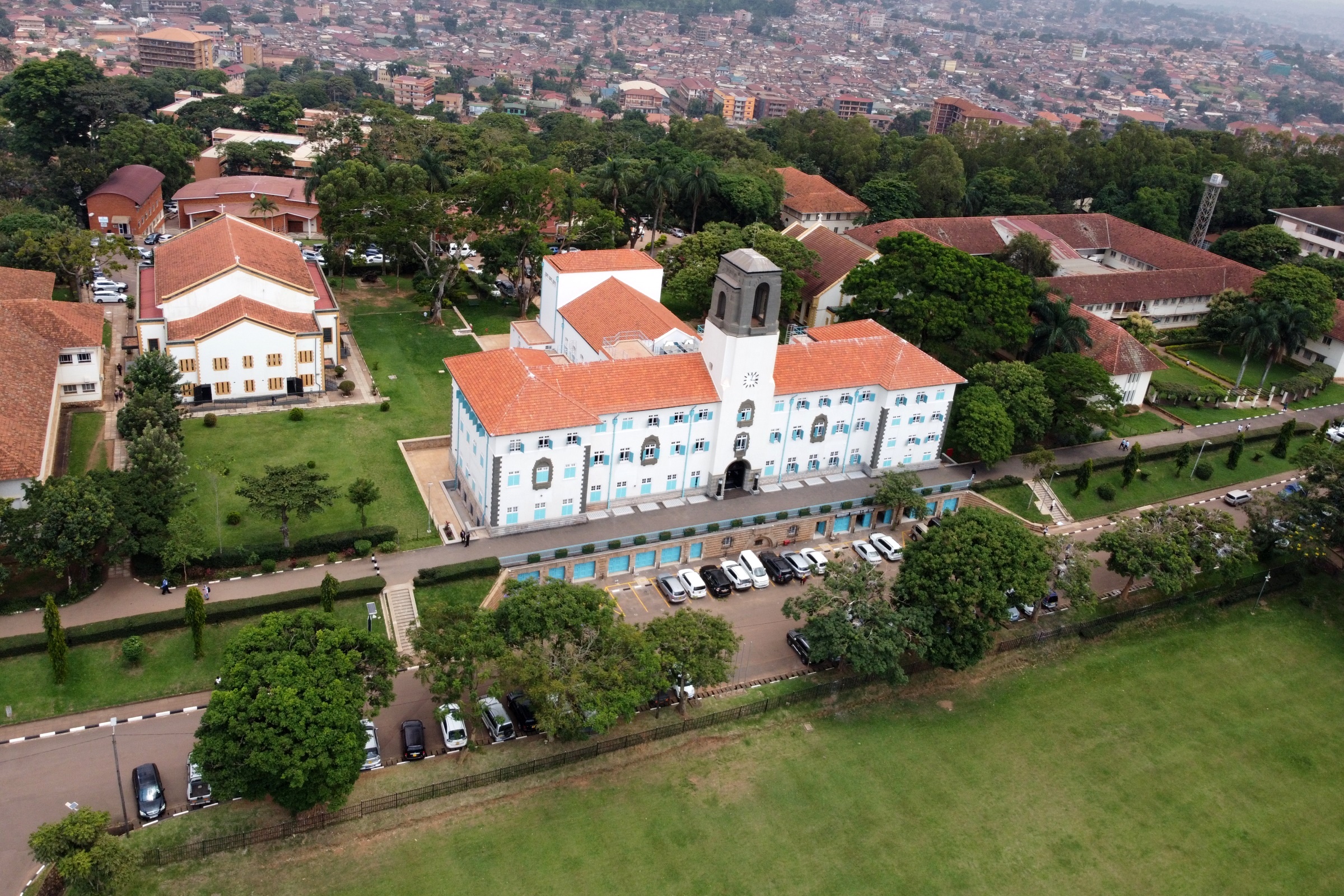The Makerere University Gender Mainstreaming Directorate (GMD) in partnership with UN Women with financial support from Spotlight Initiative and the Government of Sweden organized a two-day exhibition and Inter-University Dialogue under the theme; Orange the World, Generation equality stands against rape. Stakeholders including; TASO, Mak Health Services, FIDA, among other Non-Government Organizations, that fight against Gender Based Violence (GBV) in Uganda took part in the event. The exhibition was held on 27th and 28th November 2019 as part of the annual 16 Days of Activism, where countries from all over the world come out to sensitize and increase awareness against GBV.
Panelists at the dialogue held on 28th November 2019 were Guild Presidents from six Universities. These included; H.E. Kateregga Julius of Makerere University, Ms. Ninsiima Hellen-Vice Guild President Kyambogo University, H.E. Mboga Patrick of Uganda Martyrs University Nkozi, H.E. Waywoma Moses of Ndejje University, H.E. Johnson Noowe of Gulu University and representative of the Guild President, Kampala International University Hon. Ayinamani Kizito
The Keynote Speaker Dr. Amon Ashaba Mwiine who is also a Lecturer at the School of Women and Gender Studies, Makerere University said that 75% of the women suffer beatings and other forms of domestic violence which are perceived as normal in society. This is in actual sense against human rights and the Speaker called upon men to have respect for every human being regardless of their gender.

He noted that cases of sexual harassment have been registered not only in educational intuitions but other places as well. The Keynote Speaker added that a few cases have been handled so far and called upon everyone to take a stand and put an end to sexual harassment by following the policies and other guidelines against the immoral act.
“Sexual harassment exists but the challenge is the victims fear to come out and report the perpetrator. This is one reason why sexual harassment is increasing but my advice to all the victims is this, come out, break the silence and have the criminal punished,” said Dr. Mwiine
He condemned the act of gender imbalance among institutions and other places of work and commended Makerere University for promoting Gender equality as shown by recruitment of staff and admission of students to the university. Dr. Mwinne also thanked GMD for the efforts put place to ensure that the immoral act of sexual harassment is pushed out of the University through programmes such as the 2 for 1 challenge, peer trainers, among others.

The Director, GMD, Dr. Euzobia Mugisha Baine shared that all the 6 universities present at the dialogue were invited as participants running the Safer University project, which is aimed at promoting gender equality in higher institutions of learning.
She revealed that this year’s theme: “Orange the world, generation equality stands against rape,” takes into account all rape cases regardless of gender, although women suffer more than men. However, she noted that all measures have been put in place to respond to rape and all other cases of sexual violence.
Dr. Mugisha Baine further shared that Makerere University has a newly revised policy on sexual harassment and advised all institutions of higher learning to put in place policies to end sexual harassment and have monitoring mechanisms to see that their policies are working.
The Senior Gender Officer GMD, Mr. Eric Tumwesigye advised students to respect and treat each other as human beings as one way to end violence. He explained that Gender Based Violence causes not only physical but also emotional harm and advised people to fight against it.

“Gender Based Violence is a very abstract form of violence for people that have not come close to it. Don’t wait for it to come, use experiences that have been shared to put an end to sexual harassment,” echoed Mr. Tumwesigye.
The Vice Guild President Kyambogo University, Ms. Ninsiima Hellen defined Gender Based Violence as an injustice in community which affects the victim’s physical and psychological wellbeing and advised men to put aside their ego and speak out when offended.
According to the Guild President Gulu University, H.E. Johnson Noowe, Gender Based Violence or sexual harassment stems from people of power to those they lead as it’s those with authority that mishandle the reported cases. He added that this demoralizes the victim and also promotes the immoral act as the offender goes unpunished.

Addressing the dialogue, the 85th Guild President H.E. Kateregga Julius, thanked GMD for the way they are handling sexual harassment cases and also for the revised policies against the immoral act. These actions, he shared, include suspending the reported offender in order to avoid interferences with the investigations.
He also expressed gratitude with the way gender equity is promoted at Makerere University especially in admission of students. H.E. Katerega further revealed that Students Guild Leaders were given an opportunity to participate in the Vice Chancellor’s roster for 100; another initiative to end sexual harassment in the University.
Giving advice on how to end sexual harassment, the Guild President Uganda Martyrs University Nkoozi H.E. Mboga Patrick, tipped fellow students to speak out whenever offended. He also cautioned the university stakeholders to implement whatever they propose and discuss.

The Guild Represntative Council (GRC) Ndejje University, said that Ndejje has joined hands with Reproductive Health Uganda to kick the vice out of the university.
Representing the Guild President Kampala International University, Hon. Ayinamani Kizito urged fellow students to report the case to the persons responsible and tasked the people in charge to take immediate action.
The panel was moderated by Ms. Prosscovia Nabatte from the Public Relations Office, Makerere University and Mr. Nicholas Kamwesigye, Head of Peer Trainers at Makerere University.
Article by Rachael Kanyi, Volunteer, Mak Public Relations Office

 General2 weeks ago
General2 weeks ago
 General1 week ago
General1 week ago
 General4 days ago
General4 days ago
 Natural Sciences4 days ago
Natural Sciences4 days ago
 Health6 days ago
Health6 days ago


